Canola oil is a vegetable oil from the rapeseed plant that’s rich in monounsaturated and polyunsaturated fats, while being low in saturated fats.
For theses reasons, it’s a popular industrial oil for cooking and frying thanks to its potential heart health benefits. Research has demonstrated that when people replace saturated fats in their diet with the kind of unsaturated fats found in canola oil, their cholesterol levels are lowered and in turn their risk for heart disease goes down.
Canola oil has generated considerable controversy, though, due to the fact that many types of rapeseed plants are genetically modified.
However, many top canola oil brands are not genetically modified organisms (GMOs), and even those that are boast the same healthy fat profile.
Our research team has ranked and reviewed the ten best canola oils on the market, plus taken a look at the science behind canola oil’s benefits and side effects.
Research
Rankings
1. Aunt Patty’s Organic Canola Oil
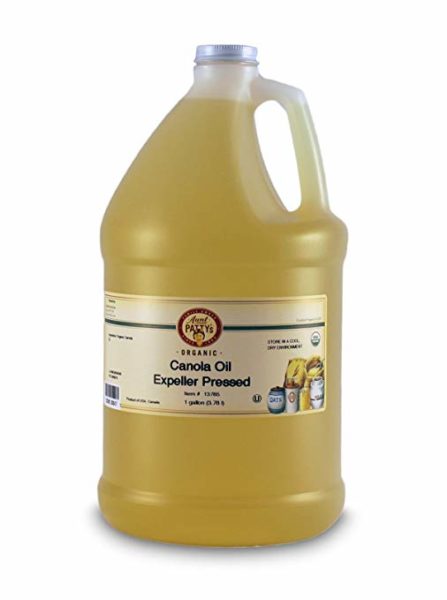
Aunt Patty’s Organic Canola Oil is our top pick thanks to its non-GMO origins and organic certification. This gallon jug of canola oil is the best choice if you are very stringent about the ingredients in the oils you cook with.
Thanks to no genetic modification and no synthetic pesticides or herbicides, you can be assured that the oil in Aunt Patty’s Organic Canola Oil is as natural as it comes.
2. La Tourangelle Organic Canola Oil
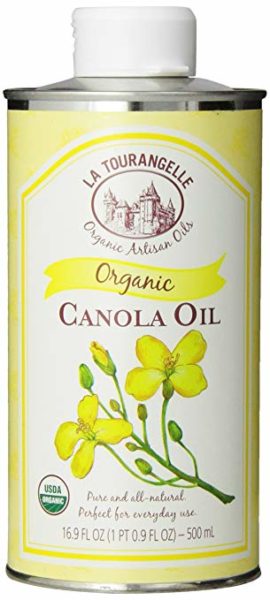
La Tourangelle Organic Canola Oil is a gourmet canola oil that’s best used for marinades, baking, and other types of cooking that call for small to moderate amounts of high quality oil.
It’s both non-GMO and organically certified, and the small 17-ounce bottles with a flip top make measuring out small amounts easy. While it’s not well-suited for deep frying, it does just about everything else marvelously well.
3. Healthy Harvest Canola Oil
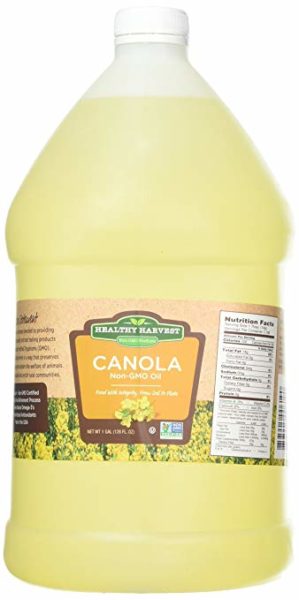
Healthy Harvest Canola Oil is a non-GMO canola oil that comes in a gallon-sized jug that makes it well-suited for large batch cooking and deep frying.
It’s shelf-stable and on top of that, the bottle itself is free of bisphenol A (BPA). These advantages make it a top pick for bulk users of canola oil.
4. Spectrum Culinary Organic Canola Oil
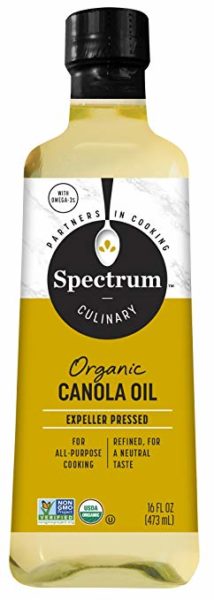
Spectrum Culinary Organic Canola Oil is a step up from the standard everyday canola oil.
First, it’s organically certified, so you can be confident that it is free of synthetic pesticides and herbicides. Moreover, this canola oil is non-GMO like many other top picks.
Finally, it’s refined in such a way that the oil handles high heat quite well compared to other canola oils. This does mean it’s more processed, but that’s a necessary tradeoff for a higher-temperature oil.
5. La Tourangelle Organic Canola Oil Spray

La Tourangelle has a new spray-based canola oil product out recently that’s excellent for cooks looking for quick, efficient application of oil but who don’t want to sacrifice on quality. It’s free of both chemicals and propellants, ensuring an all-natural coating for your pan.
6. Kirkland Signature Canola Oil Cooking Spray
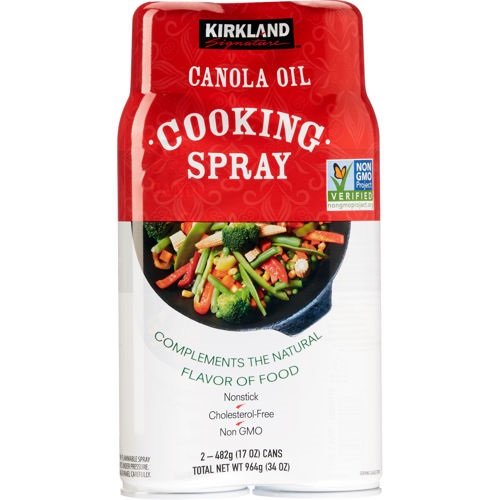
Kirkland Signature Canola Oil Cooking Spray fits a convenient niche for people who need a quick coating of oil on a pan or a dish before baking and cooking, but still want a solid, high-quality canola oil.
Kirkland Signature Canola Oil Cooking Spray is non-GMO and provides 17 ounces of oil per spray can, making it a good pick for efficient cooking.
7. 365 Organic Canola Oil Spray

365 Organic Canola Oil Spray is a spray can based canola oil that does a good job protecting cookware and helping food cook evenly. While it’s not quite at the same level as some of its spray-based competitors, it nevertheless is a solid option for quick and efficient cooking.
8. Spectrum Organic Refined Canola Oil
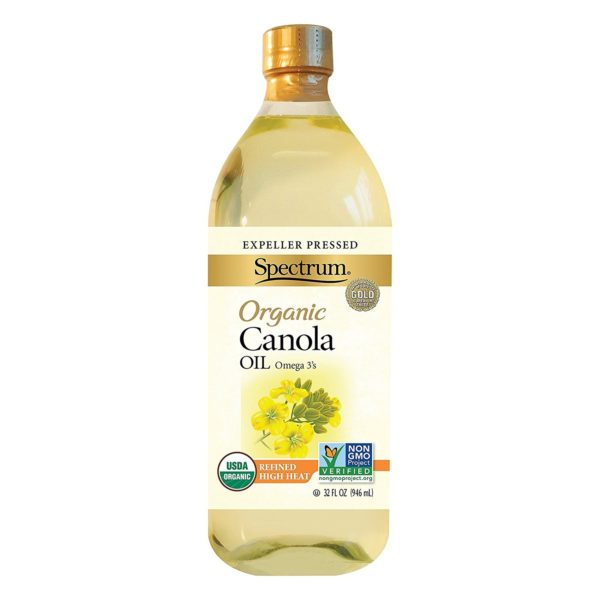
Spectrum Organic is a solid pick for a capable, everyday canola oil that’s well-suited for high temperature applications. Because it is more refined, it loses some of the flavor-enhancing properties of less processed canola oils, but it’s still a solid choice.
9. Pure Wesson Canola Oil
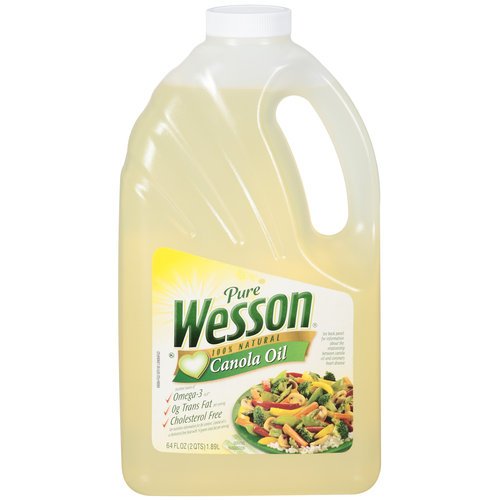
Pure Wesson is a pretty standard canola oil. Non-organic, and using GMO ingredients, both might be a turn-off for some people. The decent-sized 64 ounce container is the one upside to this otherwise middle of the road canola oil.
10. Crisco Canola Oil with DHA
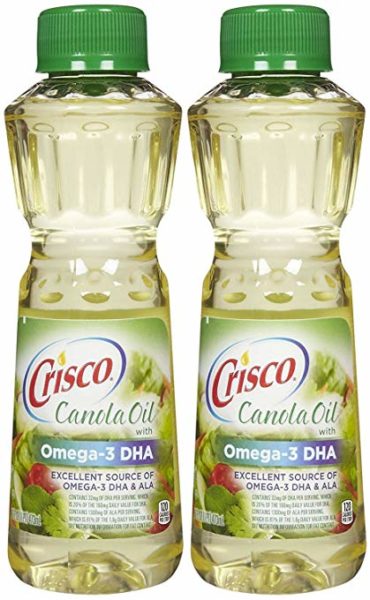
Crisco Canola Oil takes the unusual step of fortifying this canola oil with DHA and EPA, two constituents of omega 3 fatty acids that have particular health benefits.
However, adding these ingredients makes it necessary to add preservatives to make the combination shelf-stable.
Further, this canola oil is derived from genetically modified plants, so unless you are struggling to find sources of DHA and EPA in your diet and for whatever reason don’t want to take a fish oil supplement, you’d likely be better off with a different canola oil.
Category winners
Best canola oil overall: Aunt Patty’s Canola Oil
Aunt Patty’s Canola oil is organic, non-GMO, and comes in bulk. It’s the perfect choice for serious cooks who don’t want to sacrifice on quality, and as a result, Aunt Patty’s takes our top overall spot.
Best non-GMO canola oil: Aunt Patty’s Canola Oil
Getting non-GMO canola oil can be tricky, but it’s not a problem with Aunt Patty’s Canola Oil. This expeller-pressed canola oil is great for both baking and frying, especially if you need it in bulk quantities.
Best organic canola oil: La Tourangelle Organic Canola Oil
La Tourangelle takes an artisanal approach to its canola oil: this one-liter tin is made for small batches, not huge dinners. If you want a smooth, organic canola oil for occasional use, it’s our favorite.
Best spray canola oil: La Tourangelle Organic Canola Oil Spray
For fast, efficient, and mess-free cooking without sacrificing on quality, La Tourangelle is the perfect fit. Its elegant spray cans deliver pure canola oil without propellants or chemical additives, so you can always count on a smooth, even layer of high-quality oil in your pan.
Best canola oil for frying: Aunt Patty’s Canola Oil
Whether you’re frying a small batch of potatoes or a whole turkey, Aunt Patty’s is a great option. This bulk-sized and simple canola oil is an excellent “neutral” oil that will bring out the natural flavors in just about anything.
Best canola oil for baking: Spectrum Culinary Canola Oil
In the high temperatures of the oven, Spectrum Culinary Canola Oil helps impart a bit stronger of a flavor than some of the other competitors. Baking recipes that use less canola oil in an absolute sense can benefit a lot from this extra flavor.
Who Should Buy Canola Oil?
Canola oil is great for individuals of all ages, but especially persons who want to lower their cholesterol and triglycerides. Since it has a high smoke point, canola oil is great for restaurants and anyone who is considering deep frying their food.
Canola oil is free of trans-fat and is also a great baking substitute, making it perfect for bakeries. Furthermore, canola oil is tasteless, so it’s a great addition for children who are extra picky eaters.
How We Ranked
Canola oil comes in 2 main forms: oil and spray. For our rankings, we did not omit sprays, like Member’s Mark, but did rank them lower than oils since they are heavily processed. To ensure purity and quality, we preferred expeller pressed, organic products like Aunt Patty’s and Spectrum Culinary.
The canola plant is a crop that is often subjected to heavy pesticide treatment, which can make its way into the oil we consume. This can be very unhealthy, and so it was important all products on our list kept pesticides to a minimum. Furthermore, the long term effects of GMOs are not studied. To stay on the safe side, we preferred products like Healthy Harvest, that used non-GMO ingredients to formulate their canola oil products.
It’s important to keep canola oil in a cool, dark place away from heat and oxygen. Products like La Tourangelle Organic Canola Oil that used a dark bottle was rewarded for making it easier to do so. All products on our list came in airtight sealed containers to maximize freshness and extend the shelf life. Any product that didn’t was axed immediately.
Canola oil benefits and side effects
Canola oil, the pressed vegetable oil that came from the rapeseed plant, came to prominence after the push to lower dietary saturated fats in favor of unsaturated fats (both polyunsaturated and monounsaturated fats).
Canola oil does indeed provide unsaturated fats without much in the way of saturated fats, and for that reason, it’s rated as a heart-healthy food.
However, canola oil generates considerable controversy because it’s often derived from genetically modified plants. In addition, there are some questions about the safety of a few of the trace ingredients found in canola oil, though the levels of these trace ingredients tend to be quite low.
We’ll take a look at both the benefits and potential drawbacks of using canola oil for your cooking.
Canola oil is the highly processed end product derived from rapeseed, and may not be as healthy as you’ve been led to believe.
Though marketing campaigns designed to sell this (mostly) monounsaturated oil don’t make a big deal out of this fact, 90% of the rapeseed crop today has been genetically engineered by Monsanto, the biotech giant, to resist a commonly used herbicide, Roundup. (1)
Benefits
Not all canola oil is genetically modified. The jury’s still out on how foods categorized as Genetically Modified Organisms (GMOs) affect human health, but many of us would prefer a verdict before making our choices.
If you’re using canola oil that’s not labeled “Organic” or “Non-GMO,” you may be getting a whole different food product than you bargained for, along with an unwelcome effect on your health. This could take a while yet, since corporations focused on the bottom line exert great influence on the way these sort of dramas play out.
Genetically modified rapeseed is also grown in America and Australia to a lesser extent, but European countries ban the cultivation of GMO crops. (3)
Some by-products from processing rapeseed into an edible oil are sold as animal food additives often used in hog and poultry production (2), which can add a new dimension to the idea that we are what we eat. Others are shipped off to factories where soap is manufactured.
Canola oil is processed to remove erucic acid, which would otherwise cause a bad taste and smell. Rapeseed oil is cheap to produce, but it tastes and smells bad. The reason is that it contains erucic acid, a fatty acid that caused heart disease in lab rats. (5)
In order to make this oil palatable, Canadian scientists selectively bred rapeseed plants to minimize the bitter taste from glucosinolates (6) and drop the erucic acid content present in the original version until they had what they wanted: an edible, marketable oil with acceptable lipid profiles that could generate considerable profits even though it required considerable processing.
Canola oil is low in saturated fat and high in unsaturated fats. The typical breakdown of fats in canola oil is 28% polyunsaturated fatty acids (in an ideal ratio of omega-6 and omega-3 at 2:1), 63% monounsaturated fatty acids, and 7% saturated fatty acids.
Scientific evidence is conflicting on the effects of saturated fat—looking at saturated fat intake alone is not enough to make claims about health effects. You also need to consider what people people will replace the saturated fat in their diet with if they reduce saturated fat intake.
A 2015 study looked at the effects of replacing dietary saturated fat with either unsaturated fats or carbohydrates (X). The study found that reducing saturated fat intake by substituting unsaturated fats is healthy and reduces risk for cardiovascular disease, while replacing saturated fat intake with refined carbohydrates is not healthy.
During the multi-step process through which rapeseeds are refined, some of the fatty acids have turned rancid and changed into trans fats, but the amount of trans fat in canola is is fairly small—usually well under 0.5 grams per serving.
That being said, it is not zero: if you really want to keep your trans fat intake as close to zero as possible, consider something like olive oil instead.
Canola oil can decrease your LDL cholesterol and triglycerides. Several clinical trials have been conducted that have found that the unsaturated fats in canola oil lead to a decrease in LDL cholesterol (aka “bad” cholesterol) (18, 19).
Conversely, these same studies did not find an increase in HDL, also called “good” cholesterol, and they were fairly short, at only a few weeks in duration each. So, similarly to what we saw earlier, canola oil is healthy, but perhaps not the healthiest oil you can choose to consume.
Side effects
Canola oil is a good ingredient that’s generally recognized as safe by the United States Food and Drug Administration, so it’s not associated with any particular acute side effects to any greater extent than any other oil for deep frying or for cooking.
The primary concerns with canola oil are the trans fat content, which depends to some extent on the processing techniques used to extract the canola oil from the rapeseed plant.
Heat processing can cause the formation of trans fats, but more carefully processed and higher quality canola oils won’t have as high of a content of trans fats.
Small amounts of trans fat occur naturally in other foods that are generally recognized as healthy, like cheeses and yogurt, so the effects of this small amount of trans fat in the long run is not clear.
Canola oil also does not contain quite the same amount of beneficial omega 3 fatty acids that you’d find in olive oil or other top-tier sources of healthy fats, like almonds.
So, the real factor here would be the opportunity cost of not using a different type of healthier oil, rather than something intrinsically negative with canola oil.
FAQ
What are the health benefits of consuming canola oil? Adding canola oil to your diet can help reduce cholesterol and inflammation. Some studies show it that canola oil can even lower the A1C levels in patients with Type 2 diabetes (20).
Is canola oil expensive? Cold-pressed canola oil can be quite expensive. However, in general, canola oil tends to be cheaper than other plant-based oils.
Can you deep fry with canola oil? Yes, canola oil is a good oil to use when deep frying because it has a high smoke point (468 degrees Fahrenheit) and won’t burn at high temperatures (21).
Is canola oil a GMO? Yes, canola oil is usually genetically modified, but that doesn’t mean it’s bad for you. Ther vitamins in canola oil can make it fairly healthy to consume.
What vitamins are in canola oil? There are a lot of healthy fats in canola oil, like omega-3 fatty acids. Canola oil also contains vitamins such as vitamin E and vitamin K, which are good for your health.
Is canola oil considered a healthy fat? Canola oil considered a healthy fat because it’s low in saturated fat and high in “good” fat like monounsaturated fat, which helps to lower cholesterol.
Can you use canola oil in a marinade? Canola oil is a great oil to use in a marinade since it has a neutral in taste, which will allow the other herbs and spices in your marinade to shine through.
How is canola grown? Canola is a plant that grows a few feet high. The plants make pods, and the seeds inside the pods are harvested and crushed down to turn into canola oil.
Where should you store your canola oil? You’ll want to store your canola oil in a cool, dark place and keep it away from high heat and natural sunlight, as the flavor will change. Canola oil should last for up to a year if you store it in an airtight container.
Where was canola oil discovered? The word “canola” is actually an acronym. It was discovered in Canada, and the “can” in “canola” is for Canada. Canola oil actually stands for Canada Oil Low Acid.
Does canola oil have a strong smell or a strong taste? One of the reasons canola oil is a good oil to cook with is it has a very neutral taste and smell. Unlike olive oil, canola oil will not overpower your dish, allowing the other flavors you are cooking with to take over.
Does canola oil have trans-fat? While canola oil might have a trace amount of trans-fat, the levels are not low enough to register. Canola oil is healthy, and if you are watching your consumption of trans-fats, you can consume canola oil.
Can canola oil be used for baking? Yes, canola oil is suitable for baking. Because of its neutral flavor, it will not overpower the taste of your baked goods like olive oil can. It’s also a good option to use to grease your cake pan, cookie sheet, or other dishes, as it will help prevent the baked good from sticking to the pan. If you use it instead of a high-fat butter, it may lower the calorie content in your dessert.
Can canola oil be used for more than just cooking? Canola oil has a variety of uses and can be used for more than just cooking and baking. Canola oil can be used as a lubricant in industrial operations as well as in cosmetics, pesticides, and biodiesel products.
Can canola oil be used as a bug repellent? Oils like canola can be used to repel bugs. Canola oil can be a more environmentally friendly bug repellent than the average bug spray, and it can also be used by farmers to keep bugs off a field of crops.
Does canola oil have toxins? Canola oil is derived from rapeseed, and back in the 1970s in Canada, there was some controversy. There are no toxins, as the FDA regulates the amount of erucic acid in canola oil, and requires it to be less than 2% of the component fatty acids (22).
How is canola oil extracted? Canola comes from seeds, and early in the process, the seeds are flaked, which allows the oil to be easily extracted. Using machines, the seeds are pressed, which extracts the canola oil.
What is cold-pressed oil? Cold-pressing is a similar process to the normal extraction process, but the temperature is always below 100 degrees Fahrenheit, which will alter the final product of oil. It changes the taste and makes the taste stronger than average canola oil. It’s a more difficult process, which makes the price higher, but leads to a better quality product.
What is high-oleic canola oil? Canola oil is a high-oleic oil, which means it’s high in monounsaturated fat, the type of fat that’s known to lower cholesterol. High-oleic oil also is known to have no trans-fat, which can be a good thing for your heart.
Does canola oil affect your skin? Consuming canola oil is good for your skin, and you should see your skin improve if you consume it regularly. If you have really dry skin, you can apply canola oil directly to your skin, as the fats in the oil will provide instant moisture.
Is canola oil safe for pets? While you can put some canola on your pet’s food, or even help cholesterol problems in your pet, canola oil is not the best option for pets. While it’s not toxic, there are better oils to mix with your pet’s food.
Where is canola grown? While canola oil originated in Canada, it is now also grown in the U.S. in states like North Dakota, Minnesota, Montana, and Idaho. It does not require a warm, tropical climate to thrive, and grows better in cooler regions.
Can I use canola oil to season a cast-iron skillet or Dutch oven? Yes, since canola oil has such a high smoke temperature, it is a great oil to use to season a cast-iron skillet. It is a better choice than olive oil because of the high smoke temperature and because it has a more neutral taste, meaning your pan will not taste like oil or olives after it is seasoned with canola oil.
Is canola oil flammable? Yes, you need to use caution with cooking with canola oil, especially near an open flame on a gas stove. While it has a high smoke temperature, that does not mean it isn’t flammable. Mishandling canola oil can cause a grease fire in your kitchen.
Can you use canola oil in your tiki torch? Tiki torches require oil to burn the flame and are primarily used to keep bugs away. Since canola oil is a natural bug repellent, it is possible to make your own tiki torch fuel out of canola oil.
Can you make mayonnaise with canola oil? Yes, if you are making your own mayonnaise, canola oil is safe to use. Its neutral flavor will not overpower the taste of the mayo.
Is canola oil a pesticide? While canola oil is safe to use on crops to control bugs, it is not considered a pesticide since it’s not harmful to humans. This makes it a suitable alternative instead of more environmentally harmful pesticides.
Is canola oil the same thing as rapeseed oil? There are some similarities between the two oils, but they are not the same. While they come from the same seed, rapeseed oil is not as healthy as canola oil and is not used for cooking in the same way. Rapeseed oil is more used as an additive to some animal feeds and is primarily used for industrial needs.
Where does canola oil rank on the list of preferred cooking oils? Canola oil is a great option to cook with because of its high smoke point, and is generally considered healthier than many other types of oils.
Is canola oil genetically modified? No, any canola oil that is labeled organic or non-GMO is not genetically modified. Genetically Modified Organisms may affect human health adversely, so it’s best to steer clear.
Are GMO products allowed in America? Genetically modified rapeseed is grown in America, but European countries have banned the cultivation of GMO crops.
Are canola oil and rapeseed oil the same? No, canola oil and rapeseed are not the same. Rapeseed oil is cheap to produce and contains erucic acid, a fatty acid that caused heart disease in lab rats. The processing of canola oil removes erucic acid.
Does canola oil contain saturated fat? Yes, canola oil does contain saturated fat, although it is quite low, around 7%. It also contains 28% polyunsaturated fatty acids and 63% monounsaturated fatty acids.
Is saturated fat bad for you? Saturated fat can be bad for you if you have too much of it. Research has found that reducing saturated fat intake by substituting unsaturated fats is healthy and reduces the risk of cardiovascular disease.
Does canola oil have trans fat? Yes, canola oil contains small amounts of trans fat. During the multi-step process through which rapeseeds are refined, and turned into canola oil, some of the fatty acids turn rancid and change into trans fats. It should be noted that small amounts of trans fat occur naturally in other foods that are generally recognized as healthy, like cheeses and yogurt.
How does canola oil affect your cholesterol? Canola oil contains unsaturated fat that can decrease your LDL cholesterol and triglycerides. However, it does not show that canola oil can increase our good HDL cholesterol.
Is canola oil better than olive oil? Olive oil tends to be a healthier alternative when compared to canola oil. It contains more omega-3 fatty acids, no trans fats and no GMO’s.
Is canola oil bleached? Yes, canola oil is bleached during processing.
What are RBD oils? RBD stands for refined, bleached, and deodorized and references various oils, including canola, soy, and corn. RBD oils are usually devoid of nutrients like antioxidants and vitamins when compared to cold-pressed oils like olive.
Related Articles
Recap
The best canola oil is cold-pressed instead of heat-processed, because it won’t contain much in the way of trans fats. If you care about high-quality ingredients, seek out a canola oil that is organically certified and possibly GMO free.
The primary advantage of canola oil is that it is high in unsaturated fats, which are healthier for your heart than saturated fats.
That being said, canola oil does not have the same kind of beneficial effects that you’d get in something like olive oil, so it’s further down in the hierarchy of beneficial oils for your body.
There are still some concerns about the heavily processed nature of canola oil, especially when a heat process is used that can cause the formation of trans fats.
For BodyNutrition‘s #1 canola oil recommendation, click here.